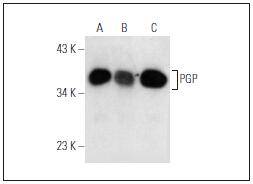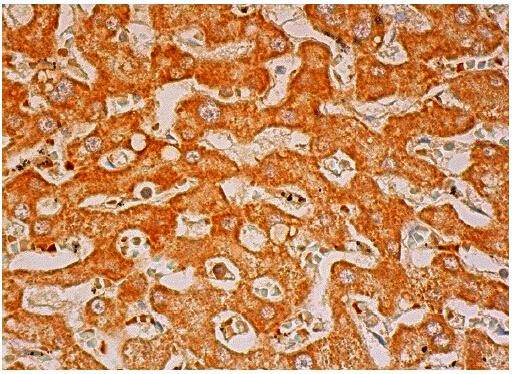Product Detail
Product NamePGP Antibody
Clone No.4G2
Host SpeciesMouse
ClonalityMonoclonal
PurificationProA affinity purified
ApplicationsWB, IP, IF, IHC(P)
Species ReactivityHu, Ms, Rt
Immunogen Descpeptide
ConjugateUnconjugated
Other NamesPGP antibody PGP_HUMAN antibody PGPase antibody Phosphoglycolate phosphatase antibody
Accession NoSwiss-Prot#:A6NDG6
Uniprot
A6NDG6
Gene ID
283871;
Calculated MW34kDa
Formulation1*TBS (pH7.4), 1%BSA, 40%Glycerol. Preservative: 0.05% Sodium Azide.
StorageStore at -20˚C
Application Details
WB: 1:100-1:1,000
IHC: 1:50-1:500
IP: 1-2 μg per 100-500 μg of total protein(1 ml of cell lysate)
Western blot analysis of PGP expression in human heart (A) and human skeletal muscle (B) tissue extracts and K-562 whole cell lysate (C).
Immunoperoxidase staining of formalin fixed, paraffin-embedded human liver tissue showing cytoplasmic staining of hepatocytes.
PGP (phosphoglycolate phosphatase), also known as PGPase, is a 321 amino acid enzyme belonging to the HAD-like hydrolase superfamily and the CbbY/cbbZ/gph/yieH family. PGP is detected in all tissues including red cells, lymphocytes and cultured fibroblasts, with highest activity found in skeletal and cardiac muscle. PGP is considered an important regulatory enzyme on oxygen transport by indirectly affecting the level of red cell 2,3-diphosphoglycerate. The gene encoding PGP maps to human chromosome 16, which encodes over 900 genes and comprises nearly 3% of the human genome. The GAN gene is located on chromosome 16 and, with mutation, may lead to giant axonal neuropathy, a nervous system disorder characterized by increasing malfunction with growth. The rare disorder Rubinstein-Taybi syndrome is also associated with chromosome 16, as is Crohns disease, which is a gastrointestinal inflammatory condition.
If you have published an article using product 48324, please notify us so that we can cite your literature.




 Yes
Yes



